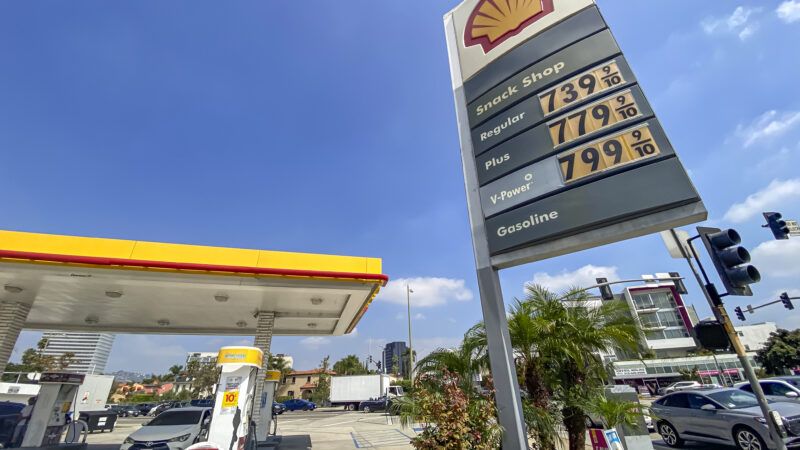Gavin Newsom's 'Price Gouging' Shtick Is Running on Empty
Gas prices in California are exceptionally high because of the state's high taxes and anti-oil regulations, not because gas station owners there are greedier.

One of the more useful functions on the social media site X (formerly known as Twitter) is its community notes feature, in which intrepid readers add context to some disingenuous post from a politician or online influencer. For instance, California Gov. Gavin Newsom recently posted a 60-second video explaining to Californians the reason for our sky-high gas prices, which he pinned on price gouging.
"Don't buy the scare tactics from Big Oil. California's clean air policies aren't the problem—greed is," according to the video posted by the governor's office. His main evidence: Oil company profits hit record highs as California gas prices soared.
Yet X's readers explained the obvious (citing the Los Angeles Times): "State leaders and experts…listed 'the relative lack of competition' among refiners, supply constraints of California's 'unique clean-burning gasoline,' and higher state taxes as three of the main points driving up prices. They have found no hard evidence of price gouging." Oil companies are national, so it really is hard to fathom why greed isn't a problem in other states.
This shocks progressives, but prices are determined by supply and demand. Every seller tries to get as high of a price as possible, while buyers want the lowest possible price. There is no "gouging" in a competitive market. By the way, I've yet to meet even the most progressive person who would willingly sell his home at a price below the going rate. Newsom touted a new state law to help battle price gouging, but his own government policies are the root of the problem.
So why exactly is there so little competition among refiners in California?
First, the state mandates an environmentally friendly formulation, which means we can't buy gasoline that's sold in Nevada or Oregon. "California's more-restrictive gasoline specifications can limit the availability of supply from other markets," explains the U.S. Energy Information Agency. Those limitations make fuels more costly to produce. It makes California vulnerable to supply disruptions if, say, one of those few refineries goes down for repair.
Second, "California pumps out the highest state gas tax rate of 77.9 cents per gallon," per the Tax Foundation. The state also raised its gas taxes in July. Although not a tax per se, new low-carbon fuel standards issued by the California Air Resources Board are expected (by the agency's estimates) to raise prices by 52 cents a gallon in 2026.
State gas prices currently are $1.30 higher than the national average, but the differential will increase thanks to this Newsom-supported state policy. Apparently the governor doesn't want gasoline prices to fall—or at least low prices aren't much of a priority.
Third, the state's climate-change policies are designed to essentially drive the oil industry out of business. Newsom touts a law that will essentially forbid the sale of new internal-combustion-engine (ICE) vehicles by 2035 by requiring all new cars to have zero tailpipe emissions.
"Cars shouldn't melt glaciers or raise sea levels, threatening our cherished beaches and coastlines," Newsom said in support of such rules. The state has already banned the sale of ICE-powered lawn equipment. Meanwhile, Newsom recently signed a law that forces oil companies to follow costly new regulations that force them to disclose their supposed climate impacts.
Attorney General Rob Bonta—with the support of Newsom—"filed a lawsuit alleging" that top oil companies engaged in a decadeslong campaign of deception regarding the reality of climate change and the connection between combustion of fossil fuels and climate change, resulting in climate change-related harms in California," according to a statement from Bonta's office.
In an X rebuttal to the Newsom video, one commenter noted that California has a shortage of oil refineries. Oil companies aren't stupid. They aren't about to invest in additional refinery capacity in a state that doesn't seem to want them here. Fewer refineries further reduce supply and drive up prices. It's no surprise that under these conditions Chevron decided to shutter its San Ramon headquarters and take 2,000 jobs to Houston—abandoning a presence here that dates to the 1870s.
Lawmakers point to research suggesting that California oil companies charge Californians a "mystery gasoline surcharge," but it's no mystery. Again, prices are a function of supply and demand. Just because an academic or bureaucrat can't identify the precise reason for every cent in the high price doesn't mean it's the result of anything nefarious. The state's specific policies keep the prices high—and consumers pay for it.
So why is Newsom doubling down on this "price gouging" nonsense? Well, it seems to be working politically. Recent surveys show most Californians blaming high taxes as the top cause, but they place price-gouging in second. "Newsom's gas price gambit is working," according to a Politico headline from July.
Still, the facts are the facts. It's sad but true that X readers have a far better grasp of the state's high gas prices than the governor.
This column was first published in The Orange County Register.


Show Comments (93)